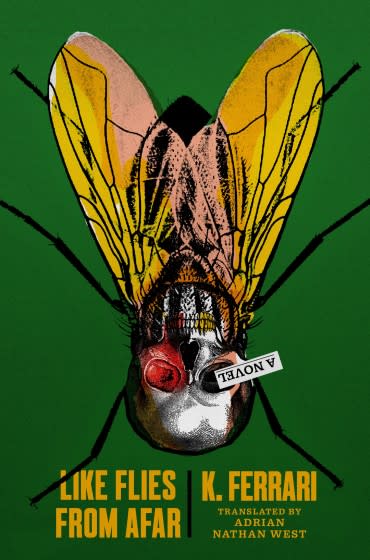Review: K. Ferrari's Argentine social noir is both existential and electric

K. Ferrari telegraphs his intentions from the outset of his novel “Like Flies From Afar.” Newly translated from the Spanish, the book opens with epigraphs from Jim Thompson, Karl Marx and David Goodis: a trinity of writers who guide, or inhabit, Ferrari’s sensibility.
Thompson and Goodis were among the most unrelenting of the 20th century American noirists, their fiction set in a universe that is indifferent, if not outright hostile, to their character’s concerns. And Marx, of course, is Marx, perhaps the most influential political philosopher of the last 175 years — regardless of whether, or to what extent, we agree with his worldview.
“Like Flies From Afar” collapses these perspectives — the hard-boiled crime novel as social allegory. Ferrari, born in 1972, was deported as a young man from the United States and works as a janitor in a Buenos Aires subway station. He has published six other books in Argentina, but this is the first to appear in English.
Unfolding over the space of a single morning, it revolves around a character known only as Mr. Machi, who, as the action begins, is in the office of his Buenos Aires club El Imperio, high on cocaine and engaged in some sexual hit-and-run.
Mr. Machi is a walking act of blunt force trauma, pushing his way through the world in his Versace sunglasses and a BMW that electrifies the road like “a black bolt of lightning” and sparking his Montecristo cigars with a gold Dupont. He is a bad father and a worse husband, a bully who has trafficked in power for so long — first during Argentina’s junta of the 1970s and now under its democratic successor — that he cannot recognize that he, like all of us, is vulnerable.
His precarity asserts itself after his tire is flattened on the Panamericana highway. On his way to retrieve the spare, he finds a man handcuffed to his trunk, his face shot away with a bullet from Mr. Machi’s own Glock.
That’s a terrific set-up for a crime novel: The locked-room murder mystery transplanted to the cocoon of the car. Ferrari, however, is not after resolution so much as entanglement, a widening net of implication in which Mr. Machi finds himself ensnared. The body in the trunk is less important in its own right than as the catalyst for an internal reckoning, in which Mr. Machi is forced, through a series of recollections, to assess the flashpoints of his life.

More often than not, these reexamined moments involve the people (his son, his enforcer, a business partner, the maid he cheats with) whom he has used or wronged. Ferrari’s plotting is ingenious, not only in the way it unveils the kaleidoscopic, potentially viral network of Mr. Machi’s connections, but also in how it shatters the illusion of his mastery to reveal “the great beast of paranoia” within.
“When all’s said and done,” he writes of Mr. Machi, who is trying to soothe himself, “I’m a good guy, he thinks. … But the crack’s already there and doubt is threatening to blow his skull wide open.” The ensuing breakdown — heightened by Ferrari’s strategy of blurring Mr. Machi’s point of view into his own as well as those of other characters — is the real subject of the novel, which is less about any external crime than the disintegration of his protagonist’s arrogant façade.
“Like Flies From Afar” is, in other words, an existential mystery, in which corruption emerges from the inside and the most pressing dangers are those we bring upon ourselves. Ferrari makes the point explicit during a scene in which Mr. Machi’s enforcer, an assassin named Pereyra, pulls a gun on a student in a Che Guevara tank top that features an inverted (and misattributed) version of Emiliano Zapata’s slogan: "Better to live on your feet than to die on your knees."
Ferrari knows exactly what he’s mocking, as he reveals with Pereyra’s response. “I’ll give you ten seconds to choose,” the killer barks, reframing the line correctly: “Live on your knees or die on your feet.” After the frightened young man sinks to the ground, he shoots him in the kneecaps anyway. The scene is horrifying but also, in context, bleakly comic, reflecting both Pereyra’s brutality and the callowness of bourgeois youth. Even as we shudder at the violence, we cannot help but appreciate the ironies.
Mr. Machi himself is not unaware of these incongruities; early in the novel, he pitches Foucault’s “The Order of Things” from his car after discovering that his daughter has left a copy there.
The postmodern text is a signifier, as Ferrari makes clear when Mr. Machi reads from it: “This book first arose out of a passage in Borges, out of the laughter that shattered, as I read the passage, all the familiar landmarks of my thought.” Something similar happens to Mr. Machi as the order of his life is swept away.
The idea takes unexpected shape late in the novel when we meet the daughter’s boyfriend, a crime writer and a radical, who decides he will “write a novel with Mr. Machi as protagonist, and terrible things would happen to him.” It’s a spectacularly meta move, framing him (perhaps) as not just author but antagonist.
For all that, “Like Flies From Afar” is hardly a work of literary gamesmanship. Instead, it offers contrapuntal pleasures — a propulsive chase across Buenos Aires as well as a finely rendered portrait of a man so enraptured by his wealth and power that he has lost sight, if he ever had it, of his frailty. The novel takes prodigious turns as Mr. Machi pushes harder, every decision leading to more disruption and more doubt.
What happens when your world blows up, when everything you thought you could count on is revealed to be a reverie? It’s a question a lot of us are asking in the surreal, occluded moment we have come to occupy.
“[H]e can’t trust his recollections just now,” Ferrari writes of Mr. Machi. “He’s nervous, he feels hemmed in, stuck in a dream or some other kind of irreality. But the stink of his own vomit tells him it’s real.”
Ulin is a former book editor and book critic of the Times.
Like Flies From Afar
K. Ferrari
Translated from the Spanish by Adrian Nathan West
Farrar, Straus and Giroux: 224 pages, $25

